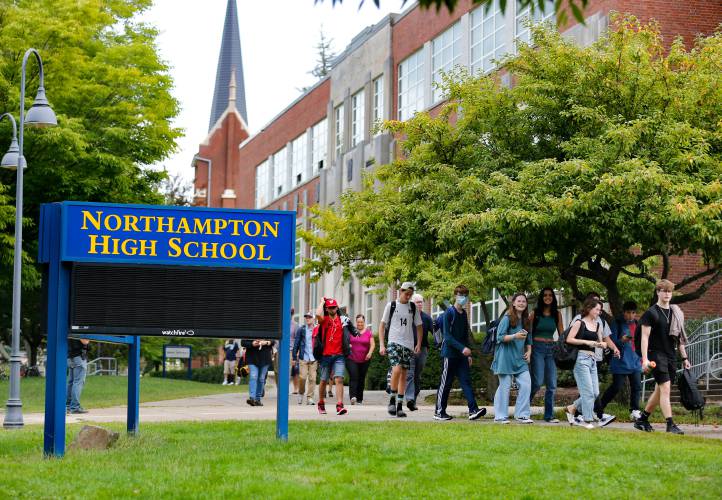Judge: Wrongful death suit can proceed against Northampton

Students leave Northampton High School. GAZETTE FILE PHOTO
|
Published: 08-09-2024 2:04 PM
Modified: 08-09-2024 4:48 PM |
A federal judge has ruled that a lawsuit against the city of Northampton over the suicide of a high school student may proceed, rebuking the city’s efforts to have the case dismissed.
Attorneys for Northampton have subsequently asked for a trial by jury.
According to the lawsuit filed by the mother of the girl, described as a biracial child suffering from anxiety and post-traumatic stress and only identified in the court documents by her initials N.M., the girl began to be bullied by a group of children her own age during the summer before she entered Northampton High School in 2018, around her 15th birthday. The harassment continued in school, involving cyberbullying, physical intimidation, threats of violence and racial remarks, the lawsuit states.
Despite multiple incidents and reports to school staff, the suit alleges that the school took none of the steps to protect the girl that are mandated under the Civil Rights Act and under its own district policies. By the spring of 2019, the girl did not feel comfortable attending school, and she attempted to take her life in May, the lawsuit states. As a result, the state Department of Children and Families contacted the school. The school official who investigators spoke to downplayed the bullying as “peer on peer conflict” and also characterized the girl as the aggressor, according to the lawsuit.
The original complaint against the city alleges nine counts of negligence, negligent infliction of emotional distress, intentional infliction of emotional distress, violation of civil rights, retaliation for conduct protected under the First Amendment, wrongful death and punitive damages.
The city had moved to have the case dismissed, saying the facts were insufficient to support the claims brought forward in the lawsuit.
In a July 1 ruling, U.S. District Judge Mark Mastroianni, following the recommendations of U.S. Magistrate Judge Katharine Robertson, agreed to dismiss counts relating to negligence, emotional distress and punitive damages, but that the counts related to civil rights and First Amendment violations as well as the allegation of wrongful death would be allowed to go forward.
In the ruling, Mastroianni wrote that the claims of civil rights violations are supported by the allegations that the school had an “unwritten policy to intentionally downgrade and misclassify bullying incidents as incidents of ‘peer on peer conflict.’”
Article continues after...
Yesterday's Most Read Articles
 ‘Delightful’ Northampton store shopping guide Jane Hertz, 88, seeking next gig
‘Delightful’ Northampton store shopping guide Jane Hertz, 88, seeking next gig
 ‘Whole campus’ approach: UMass working to help six students whose visas, status were revoked
‘Whole campus’ approach: UMass working to help six students whose visas, status were revoked
 Five UMass Amherst students have visas, student status revoked
Five UMass Amherst students have visas, student status revoked
 Amherst finance director to return to UMass
Amherst finance director to return to UMass
 ‘Hands Off’ protest: 5,000 people in half-dozen Hampshire County communities protest against Trump policies
‘Hands Off’ protest: 5,000 people in half-dozen Hampshire County communities protest against Trump policies
 Long-vacant former Faces spot in Northampton gets new tenant
Long-vacant former Faces spot in Northampton gets new tenant
He noted that the complaint contained several allegations including that NHS officials knew of the bullying directed at the student before her enrollment but did nothing to stop it, that the bullying was racial in nature, and the school suspended the student multiple times after she had been physically assaulted, plausibly implying that she had been the aggressor.
“When viewed in isolation, each of these allegations might not support a plausible inference that an unconstitutional policy or custom was in force,” Mastroianni wrote. “However, when viewed in their entirety, these factual allegations support the plausible existence of the unconstitutional policy articulated by Plaintiff.”
Mastroianni also agreed that the plaintiff adequately alleged the existence of “severe and pervasive” racial harassment targeted at the student, such as a student telling her she was “not black enough” to wear her hair in braids. It also alleges that an NHS assistant principal had told the student that wearing “flashy eyelashes” would make her a target for harassment, and then told the student that “but I know [the eyelashes] are cultural for you.”
The assistant principal’s “awareness that N.M. was targeted for harassment because of an element of her personal appearance deemed ‘cultural’ supports a plausible inference that it was well known to faculty, staff, and students that N.M.’s bullying was driven, at least in part, by race-based animus,” the judge wrote.
With regards to the First Amendment violation, Mastroianni cited the student’s multiple suspensions, with the plaintiff alleging they were in retaliation for reporting incidents of bullying.
“The court finds it plausible that the moving force behind these suspensions was Defendant’s custom or policy of misclassifying incidents of bullying,” he wrote. “In other words, if Defendant had not adopted this custom or policy, N.M. would have been treated as a victim of bullying and consequently would not have been suspended for incidents in which she was not the aggressor.”
Following the ruling by Mastroianni, the city filed a formal response to the lawsuit on July 29, denying the allegations contained within counts the school continues to face, calling for a trial by jury.
The city’s attorney in the case, Jeffrey Trapani of the law firm Pierce, Davis & Perritano added that the “incidents or events as alleged in the plaintiff’s complaint were not caused by any person for whose conduct [the school] is legally responsible.”
The city also made the defense that the student or her mother were “more than 50% at fault in causing the alleged injuries,” and subsequently negligence statues did not apply.
Alexander MacDougall can be reached at amacdougall@gazettenet.com.






 Q&A with UMass President Marty Meehan
Q&A with UMass President Marty Meehan Leverett will consider accepting 147-acre working forest at May’s town meeting; public hearing this Thursday
Leverett will consider accepting 147-acre working forest at May’s town meeting; public hearing this Thursday
